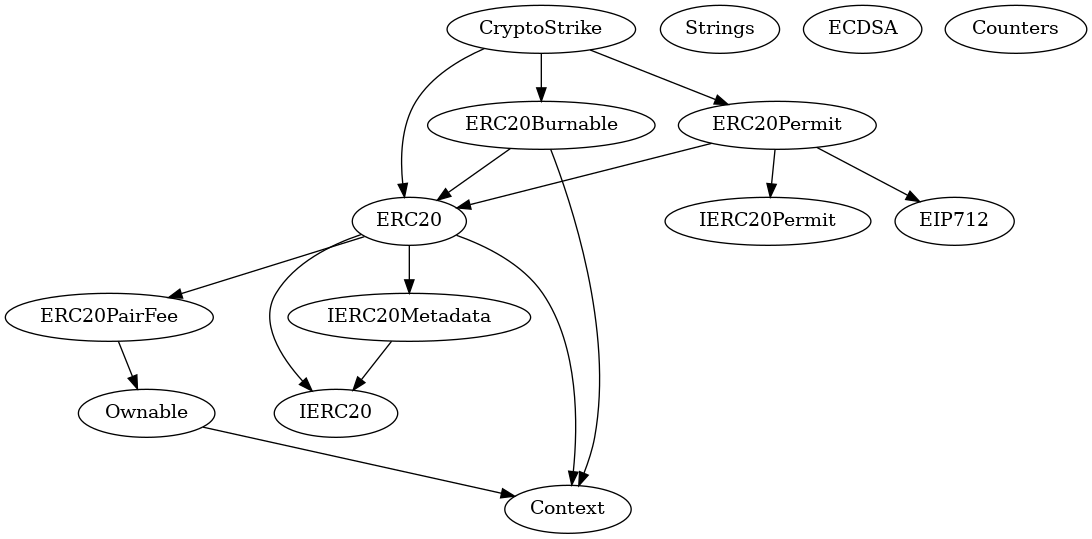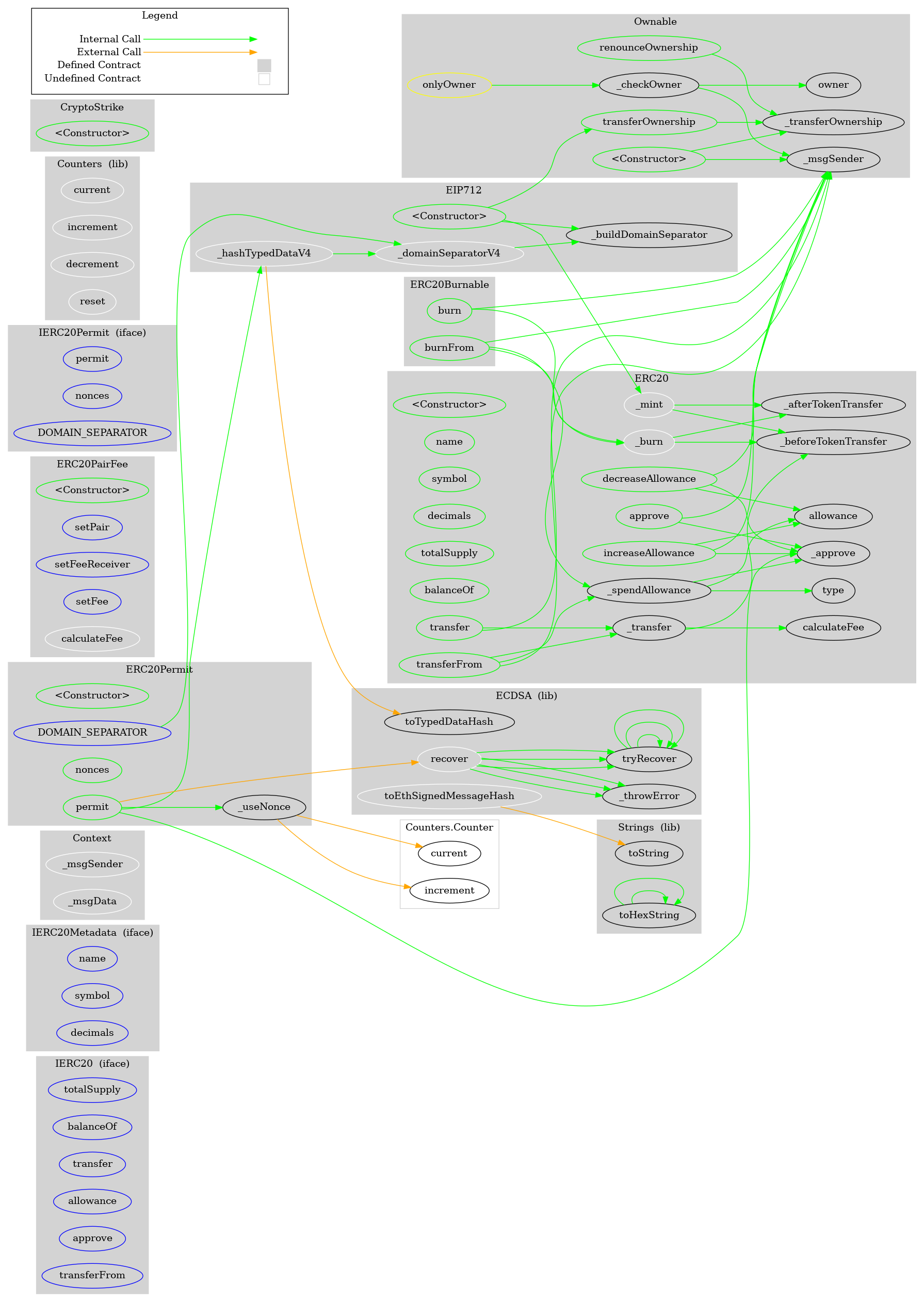Crypto Strike
Smart Contract Audit Report
Audit Summary
Crypto Strike is a new BEP-20 token on the Binance Smart Chain.
For this audit, we reviewed the project team's CryptoStrike contract at 0x1815b685Dd8509d72ba9D609e09c766B636fBC62 on the Binance Smart Chain Mainnet.
Audit Findings
No findings were identified, though some centralized aspects are present.
Date: November 7th, 2022.
Contract Overview
- The total supply of the token is set to 1 billion $STRIKE [1,000,000,000].
- No mint functions are accessible beyond deployment.
- Any user can burn their own tokens to reduce the total supply.
- Any user can burn tokens on another user's behalf if an allowance has been granted.
- At the time of writing this report, there are 3 total token holders. The token allocation is as follows:
- 97% of the total supply is stored in a PinkSale token vesting contract. 100% of these tokens will unlock on March 31st, 2023.
- 2.48% of the total supply belongs to an unverified contract.
- The remaining 0.53% of the total supply belongs to the owner.
- There is a buy fee and sell fee on all transfers via an approved DEX set by the owner.
- The tokens collected through the fee are sent to the team's Fee wallet.
- The contract implements the EIP-2612 standard to support permits which allows for approvals to be made via signatures.
- As the contract is implemented with Solidity v0.8.x, it is safe from any possible overflows/underflows.
- The contract complies with the BEP-20 token standard.
- The owner can set the buy fee and sell fee to any percentages at any time.
- The owner can add/remove any addresses as a Dex pair address at any time.
- The owner can update the team's Fee wallet at any time.
Audit Results
| Vulnerability Category | Notes | Result |
|---|---|---|
| Arbitrary Jump/Storage Write | N/A | PASS |
| Centralization of Control | The owner can set the buy fee and sell fee to any percentages at any time. | WARNING |
| Compiler Issues | N/A | PASS |
| Delegate Call to Untrusted Contract | N/A | PASS |
| Dependence on Predictable Variables | N/A | PASS |
| Ether/Token Theft | N/A | PASS |
| Flash Loans | N/A | PASS |
| Front Running | N/A | PASS |
| Improper Events | N/A | PASS |
| Improper Authorization Scheme | N/A | PASS |
| Integer Over/Underflow | N/A | PASS |
| Logical Issues | N/A | PASS |
| Oracle Issues | N/A | PASS |
| Outdated Compiler Version | N/A | PASS |
| Race Conditions | N/A | PASS |
| Reentrancy | N/A | PASS |
| Signature Issues | N/A | PASS |
| Unbounded Loops | N/A | PASS |
| Unused Code | N/A | PASS |
| Overall Contract Safety | PASS |
Inheritance Chart

Function Graph

Functions Overview
($) = payable function
# = non-constant function
Int = Internal
Ext = External
Pub = Public
+ [Int] IERC20
- [Ext] totalSupply
- [Ext] balanceOf
- [Ext] transfer #
- [Ext] allowance
- [Ext] approve #
- [Ext] transferFrom #
+ [Int] IERC20Metadata (IERC20)
- [Ext] name
- [Ext] symbol
- [Ext] decimals
+ Context
- [Int] _msgSender
- [Int] _msgData
+ Ownable (Context)
- [Pub] #
- [Pub] owner
- [Int] _checkOwner
- [Pub] renounceOwnership #
- modifiers: onlyOwner
- [Pub] transferOwnership #
- modifiers: onlyOwner
- [Int] _transferOwnership #
+ ERC20PairFee (Ownable)
- [Pub] #
- [Ext] setPair #
- modifiers: onlyOwner
- [Ext] setFeeReceiver #
- modifiers: onlyOwner
- [Ext] setFee #
- modifiers: onlyOwner
- [Int] calculateFee
+ ERC20 (Context, IERC20, IERC20Metadata, ERC20PairFee)
- [Pub] #
- modifiers: ERC20PairFee
- [Pub] name
- [Pub] symbol
- [Pub] decimals
- [Pub] totalSupply
- [Pub] balanceOf
- [Pub] transfer #
- [Pub] allowance
- [Pub] approve #
- [Pub] transferFrom #
- [Pub] increaseAllowance #
- [Pub] decreaseAllowance #
- [Int] _transfer #
- [Int] _mint #
- [Int] _burn #
- [Int] _approve #
- [Int] _spendAllowance #
- [Int] _beforeTokenTransfer #
- [Int] _afterTokenTransfer #
+ ERC20Burnable (Context, ERC20)
- [Pub] burn #
- [Pub] burnFrom #
+ [Int] IERC20Permit
- [Ext] permit #
- [Ext] nonces
- [Ext] DOMAIN_SEPARATOR
+ EIP712
- [Pub] #
- [Int] _domainSeparatorV4
- [Prv] _buildDomainSeparator
- [Int] _hashTypedDataV4
+ [Lib] Strings
- [Int] toString
- [Int] toHexString
- [Int] toHexString
- [Int] toHexString
+ [Lib] ECDSA
- [Prv] _throwError
- [Int] tryRecover
- [Int] recover
- [Int] tryRecover
- [Int] recover
- [Int] tryRecover
- [Int] recover
- [Int] toEthSignedMessageHash
- [Int] toEthSignedMessageHash
- [Int] toTypedDataHash
+ [Lib] Counters
- [Int] current
- [Int] increment #
- [Int] decrement #
- [Int] reset #
+ ERC20Permit (ERC20, IERC20Permit, EIP712)
- [Pub] #
- modifiers: EIP712
- [Pub] permit #
- [Pub] nonces
- [Ext] DOMAIN_SEPARATOR
- [Int] _useNonce #
+ CryptoStrike (ERC20, ERC20Burnable, ERC20Permit)
- [Pub] #
- modifiers: ERC20,ERC20Permit
About SourceHat
SourceHat has quickly grown to have one of the most experienced and well-equipped smart contract auditing teams in the industry. Our team has conducted 1300+ solidity smart contract audits covering all major project types and protocols, securing a total of over $50 billion U.S. dollars in on-chain value across 1500 projects!.
Our firm is well-reputed in the community and is trusted as a top smart contract auditing company for the review of solidity code, no matter how complex. Our team of experienced solidity smart contract auditors performs audits for tokens, NFTs, crowdsales, marketplaces, gambling games, financial protocols, and more!
Contact us today to get a free quote for a smart contract audit of your project!
What is a SourceHat Audit?
Typically, a smart contract audit is a comprehensive review process designed to discover logical errors, security vulnerabilities, and optimization opportunities within code. A SourceHat Audit takes this a step further by verifying economic logic to ensure the stability of smart contracts and highlighting privileged functionality to create a report that is easy to understand for developers and community members alike.
How Do I Interpret the Findings?
Each of our Findings will be labeled with a Severity level. We always recommend the team resolve High, Medium, and Low severity findings prior to deploying the code to the mainnet. Here is a breakdown on what each Severity level means for the project:
- High severity indicates that the issue puts a large number of users' funds at risk and has a high probability of exploitation, or the smart contract contains serious logical issues which can prevent the code from operating as intended.
- Medium severity issues are those which place at least some users' funds at risk and has a medium to high probability of exploitation.
- Low severity issues have a relatively minor risk association; these issues have a low probability of occurring or may have a minimal impact.
- Informational issues pose no immediate risk, but inform the project team of opportunities for gas optimizations and following smart contract security best practices.
